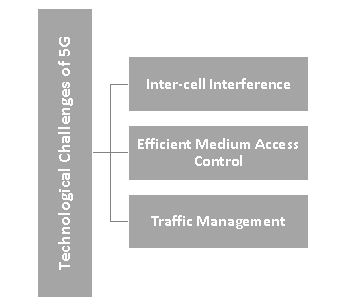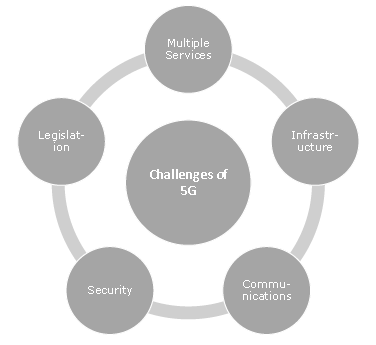- Inter-cell Interference − This is one of the major technological issues that need to be solved. There is variations in size of traditional macro cells and concurrent small cells that will lead to interference.

- Efficient Medium Access Control − In a situation, where dense deployment of access points and user terminals are required, the user throughput will be low, latency will be high, and hotspots will not be competent to cellular technology to provide high throughput. It needs to be researched properly to optimize the technology.
- Traffic Management − In comparison to the traditional human to human traffic in cellular networks, a great number of Machine to Machine (M2M) devices in a cell may cause serious system challenges i.e. radio access network (RAN) challenges, which will cause overload and congestion.
Common Challenges
- Multiple Services − Unlike other radio signal services, 5G would have a huge task to offer services to heterogeneous networks, technologies, and devices operating in different geographic regions. So, the challenge is of standardization to provide dynamic, universal, user-centric, and data-rich wireless services to fulfil the high expectation of people.

- Infrastructure − Researchers are facing technological challenges of standardization and application of 5G services.
- Communication, Navigation, & Sensing − These services largely depend upon the availability of radio spectrum, through which signals are transmitted. Though 5G technology has strong computational power to process the huge volume of data coming from different and distinct sources, but it needs larger infrastructure support.
- Security and Privacy − This is one of the most important challenges that 5G needs to ensure the protection of personal data. 5G will have to define the uncertainties related to security threats including trust, privacy, cybersecurity, which are growing across the globe.
- Legislation of Cyberlaw − Cybercrime and other fraud may also increase with the high speed and ubiquitous 5G technology. Therefore, legislation of the Cyberlaw is also an imperative issue, which largely is governmental and political (national as well as international issue) in nature.
5G - Future Scope
Several researches and discussions are going on across the world among technologists, researchers, academicians, vendors, operators, and governments about the innovations, implementation, viability, and security concerns of 5G.
As proposed, loaded with multiple advance features starting from the super high speed internet service to smooth ubiquitous service, 5G will unlock many of the problems. However, the question is — in a situation, where the previous technologies (4G and 3G) are still under process and in many parts yet to be started; what will be the future of 5G?

5th generation technology is designed to provide incredible and remarkable data capabilities, unhindered call volumes, and immeasurable data broadcast within the latest mobile operating system. Hence, it is more intelligent technology, which will interconnect the entire world without limits. Likewise, our world would have universal and uninterrupted access to information, communication, and entertainment that will open a new dimension to our lives and will change our life style meaningfully.
Moreover, governments and regulators can use this technology as an opportunity for the good governance and can create healthier environments, which will definitely encourage continuing investment in 5G, the next generation technology.